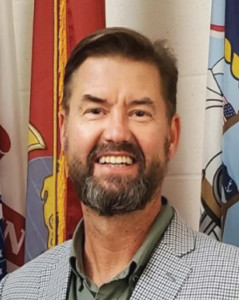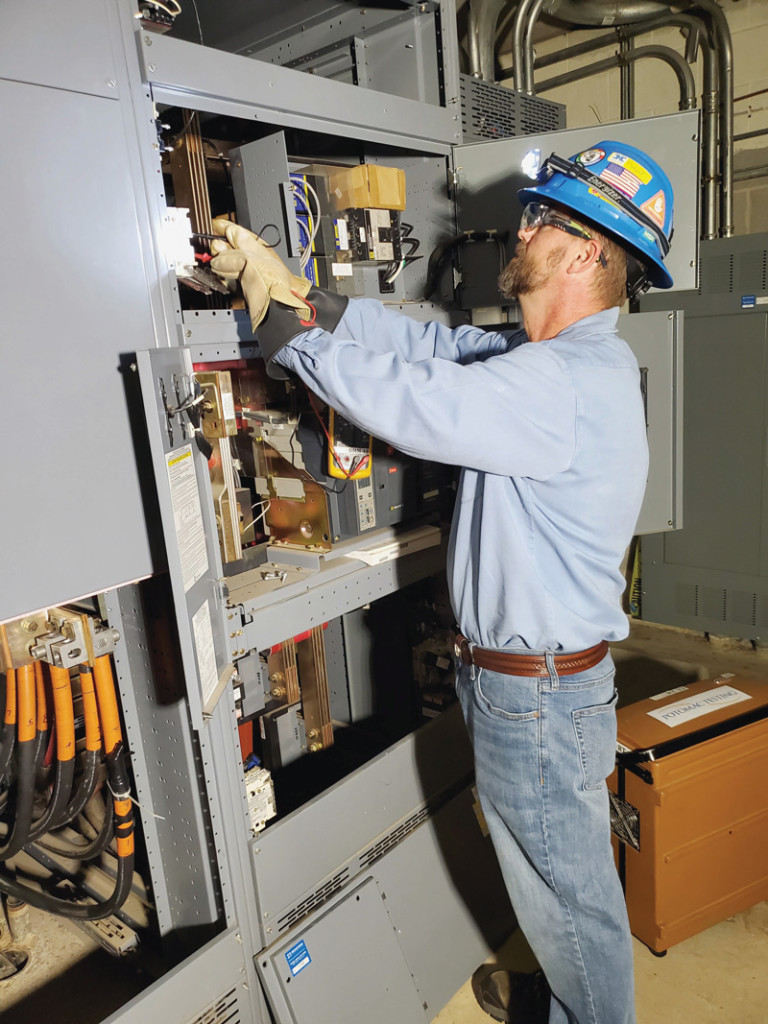
Wyatt Hamrick
Thirty-one years into his career, Potomac Testing Project Manager Wyatt Hamrick says he is humbled by the lessons he has learned, but also proud of the many achievements and fond memories his career has provided.
With 10 years of service in the U.S. Army and 21 years of electrical testing experience under his belt, Hamrick says his own deep curiosity — which led his younger self to disassemble countless gifts to learn more about electricity — was the beginning of his approach to his work as a NETA Level 4 Technician. From there, his mentors, his efforts to gain as much knowledge as possible, and a very positive employment experience at Potomac Testing eventually led to a transition to his current position as a project manager and a love for his profession. Hamrick also holds a BS in management of technology from Athens State University and is a Master Electrician.
Here, Hamrick describes his journey and shares his focus on how we must continuously adapt our safety practices for fast-paced multiphase projects.
NWJ: What attracted you to electrical testing?
Hamrick: For as long as my memory serves, I have always had a deep curiosity and amazement about electricity. If you were anything like me as a child, you should immediately call to thank and/or apologize to all those who nurtured your inquisitive nature. All through my early years, I disassembled countless birthday and Christmas gifts in an effort to learn more about electricity. I realize now that those early days of destruction ultimately led to building the foundation for my career in electrical testing. For me, electrical testing provides a dynamic space to understand and test many of the truths and mysteries of electricity.
NWJ: How long have you been in the field, and how did you get started?
Hamrick: I have been in the field for as long as I can remember, starting as an electrician’s helper for my dad. This early insight into the trade encouraged me to pursue various courses in electricity and electronics during high school, then trade schools and colleges, followed by extensive military training. To date, my professional career totals approximately 31 years. My first 10 years was spent with the U.S. Army as a HAWK Missile System Radar Technician, then as a Prime Power Technician. I am fortunate that my last 21 years have been spent with my current employer, Potomac Testing.

NWJ: How did you get to your current position?
Hamrick: Clearly, I must have lingered too long near the management side of too many projects. Project management was definitely a long-term consideration and a goal I set along with Potomac Testing leadership before transitioning to the office, but my formative years helped create a strong belief in me that my place was in the field. This belief allowed me to focus my efforts on gaining as much knowledge as possible, similar to those experienced senior technicians who blazed the trail before me. Although I tried like hell, I was never able to surpass my greatest mentors because as I grew, they did, as well. Somewhere along the way, my growth and development narrowed the gap between my roles as a field technician and project manager and eventually led to a natural transition to my current position as a project manager.
NWJ: Who has influenced or mentored you along the way?
Hamrick: This is a very abbreviated list! Most importantly, my parents, for seeing and supporting my pursuits and interests. Next, several military instructors, but one in particular comes to mind as an important influencer. While I have long since forgotten his name, this instructor’s motivational words continue to impact my life, and remain with me to this day:
“This is your job.
Know your job.
No one should ever have to do your job for you.”
That may seem simple, but it has stuck with me for almost three decades. The list of NETA technicians who have mentored and influenced me is too long to list here, but I want to give a special shout out to Bryan Hunter, Craig Biggs, and Steve Meader. Thank you! I am also extremely grateful that Ken Bassett took a chance on me and created an environment that to this day provides positive, never-ending challenges and puzzles to solve.
NWJ: What about this work keeps you committed to the profession?
Hamrick: I have a healthy fascination with all the ways electricity can be used and misused. Most of all, and I’m speaking NETA-wide, I love doing good work with smart people who give a damn. Our skills, experience, and training allow us to perform meaningful work.
NWJ: Describe one of your best workdays…what happened?
Hamrick: It was a one-day outage to troubleshoot and repair a defective transfer scheme. The customer had no historical knowledge nor associated drawings of the equipment. A highly respected senior technician and I were tasked to investigate, test, reverse engineer, repair, and sketch an old and somewhat complicated system. By understanding and trusting each other’s technical abilities, we were able to divide the problem and attack it from multiple directions. We poured ourselves into this effort, and as a result, found and successfully corrected several mis-wired and defective components.
Although the customer was happy, only the two us knew and could fully appreciate the level of achievement we experienced. In short, the best workdays include teamwork with people you like and respect, taking on difficult tasks, and achieving desired goals.
NWJ: Share the story of a day that didn’t go as planned. How did you respond and what did you learn?
Hamrick: Many days have not gone as planned, but the project that stands out for me was an assessment of an industrial complex after a hurricane decimated a community. This task was originally slated for 10 days of assessment but quickly developed into a six-week recovery and repair project.
Our team was not prepared for many aspects of this project, especially for the physical and mental suffering of those we were working for. To start the project, our only available lodging was an RV that was not equipped with electricity, running water, or laundry appliances. The client’s site had sustained flood waters in the lower levels of the facility and significant rainwater intrusion in the upper levels. The various products in this facility — plus God knows what from the streets — had mixed and infiltrated much of the electrical distribution. The situation was tragic, and the working conditions were abysmal.
On Day 11, I took a long drive out of the disaster area searching for an open store that could provide me with fresh underwear and other normal creature comforts. With those essentials obtained, I returned to finish project. How did I respond? I followed the advice of my beautiful wife, who was at home with our infant and toddler. Paula’s advice was, “Suck it up, Buttercup. Do what you do best, and hurry home.” We not only achieved, but far surpassed the expectations of our customer. What I learned about planning for disaster recovery assignments was to over-plan for your provisions and build and support your home team.
NWJ: What energy trend do you think will affect your work in the future?
Hamrick: The increased need to expand our nation’s power grids and generation plants will have a huge effect on our future work. Additionally, the ever-expanding interconnectivity of devices and systems will continue to affect everything we do. NETA technicians will continue to be an essential piece of the security and reliability requirements surrounding these delicate systems.
NWJ: As an industry, what do you think should be our No. 1 priority over the next year?
Hamrick: Our No. 1 priority must always be legitimate safety practices. Of increasing concern to me is how we must continuously adapt our safety practices for fast-paced multiphase projects. Our electrical testing industry has definitely made great advancements in safety over the last couple of decades, but we are not alone in this overall industry. Project timelines and milestones remain constant, regardless of growing supply-chain shortages and associated delays. These delays invariably lead to schedule compression while simultaneously introducing hazardous conditions to our job sites that were not previously a concern.
To continue safely, we must demand proper communications from those working around us, as well as strict enforcement of hazard analysis and lockout/tagout procedures. Additionally, we must constantly verify and test our means of protection. Perhaps the most vital key to maintaining safety on these types of projects is a vigilant site leader who is in constant communication with all parties at all times. Finally, all team members must know that they are fully empowered and expected to stop work if these communications are not occurring or our safety protocols are being infringed upon.
NWJ: If you were talking to a young person interested in knowing more about being an electrical testing technician, how would you describe the job, and what advice would you give them?
Hamrick: Our profession is a great career choice with excellent pay and benefits. You will need to continually assess your current understanding of our craft and test what you know to be true. Ask many questions; learn new and old products, software, and methods; and study literature written by those who have explored those gaps before you.
We are in high demand due to our professionalism, specialized training, and experience. In our lifetime, I see no end for the need for our services. Our work has meaning, and you should never be bored working in this every-changing industry.
At first, most new technicians will be rightfully fearful. They typically will not do anything without proper instruction and confirmation of their safety. Eventually, after many years in the field, technicians will have learned or experienced enough near-misses for safety to be deeply impressed upon their consciousness. Be extra concerned during the in-between years. Although you should never trust your safety to anyone, a second set of eyes is always encouraged. They may save your life one day.
NWJ: Is there anything else you’d like to share?
Hamrick: I hope that all NETA techs enjoy their profession. I have truly enjoyed this career and time has flown by. I am humbled by the lessons I have learned, but also very proud of the many achievements and fond memories this career has provided.
The motto I took from the US Army Corp of Engineers was “Essayons!” This explanation of that motto (with just a few word swaps) explains the drive of the best NETA Technicians and the wider NETA team.
“The U.S. Army Engineer Regimental motto is ‘Essayons!’ It is French for ‘Let us try.’ This isn’t a sympathetic, half-hearted try. It’s a statement of confidence, almost as if to say, ‘Where others failed, we will succeed.’”
I wanted to be an engineer because I wanted to succeed where others hadn’t yet. I wanted a diverse mission set that required me to be physically fit and mentally sharp. Now, I’m just trying to make a difference.